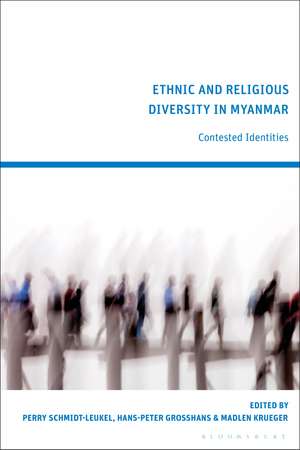Ethnic and Religious Diversity in Myanmar: Contested Identities
Editat de Perry Schmidt-Leukel, Hans-Peter Grosshans, Madlen Kruegeren Limba Engleză Paperback – 28 iun 2023
| Toate formatele și edițiile | Preț | Express |
|---|---|---|
| Paperback (1) | 193.36 lei 6-8 săpt. | |
| Bloomsbury Publishing – 28 iun 2023 | 193.36 lei 6-8 săpt. | |
| Hardback (1) | 541.44 lei 6-8 săpt. | |
| Bloomsbury Publishing – 29 dec 2021 | 541.44 lei 6-8 săpt. |
Preț: 193.36 lei
Preț vechi: 250.45 lei
-23% Nou
Puncte Express: 290
Preț estimativ în valută:
36.100€ • 40.32$ • 31.18£
36.100€ • 40.32$ • 31.18£
Carte tipărită la comandă
Livrare economică 23 aprilie-07 mai
Preluare comenzi: 021 569.72.76
Specificații
ISBN-13: 9781350187467
ISBN-10: 1350187461
Pagini: 312
Ilustrații: 10 bw illus
Dimensiuni: 156 x 234 x 25 mm
Greutate: 0.44 kg
Editura: Bloomsbury Publishing
Colecția Bloomsbury Academic
Locul publicării:London, United Kingdom
ISBN-10: 1350187461
Pagini: 312
Ilustrații: 10 bw illus
Dimensiuni: 156 x 234 x 25 mm
Greutate: 0.44 kg
Editura: Bloomsbury Publishing
Colecția Bloomsbury Academic
Locul publicării:London, United Kingdom
Caracteristici
Expands the study of religion and religious identities from both Buddhism and the current conflict framed between Buddhists and Muslims
Notă biografică
Perry Schmidt-Leukel is Professor of Religious Studies and Intercultural Theology at the University of Muenster, Germany.Hans-Peter Grosshans is Professor of Systematic and Ecumenical Studies at the University of Muenster, Germany.Madlen Krueger is a Postdoctoral Researcher at the University of Muenster, Germany.
Cuprins
List of FiguresList of ContributorsIntroduction, Madlen Krueger (University of Muenster, Germany) and Perry Schmidt-Leukel, University of Muenster, Germany)Part I: Politics and Identities1. The Making of a Fixed National Hierarchy of Ethnicity in Myanmar, Mikael Gravers (Aarhus University, Denmark)2. Ethnic Minorities and Myanmar's Democratization, Nehginpao Kipgen (Jindal School of International Affairs, India)3. Ne Win's Echoes: Burmanization Policies and Peace-building in Myanmar Today, Saw Eh Htoo (Payap University, Chiang Mai, Thailand)Part II: The Case of Buddhism4. Visual Culture and Identity: Ethnic and Religious Diversity in the Eastern Shan State, Klemens Karlsson (Chiang Mai University, Thailand)5. Tempered Tantrism: Buddhism of Exception on the Shan Plateau, Jane M Ferguson (Australian National University, Australia)6. Reflections on Religion and Identity: With a Particular Emphasis on Theravada Buddhism, Perry Schmidt-Leukel, University of Muenster, Germany)7. Coexistence in Myanmar: Challenges and Prospects, Alexander Horstmann (Tallinn University, Estonia)Part III: The Case of Christianity8.Christianity in Myanmar. With a Particular Emphasis on its Indian Roots, Marja-Leena Heikkilä-Horn (Mahidol University International College Thailand)9. Problems and Challenges facing Ethnic Diversity of Myanmar: A Socio-Historical Analysis from a Christian Perspective, Samuel Ngun Ling (Myanmar Institute of Theology, Myanmar)10. Burmanization and Its Effects on the Kachin Ethnicity in Myanmar, Layang Seng Ja (Kachin Theological College & Seminary, Kachin State, Myanmar)Part IV: The Case of Islam11. Islam in Myanmar and Ethnic Diversity, Myint Thein, Al-Azhar (Islamic Institute of Myanmar, Peace Cultivation Network, Myanmar)12. Citizenship Documentation of Myanmar and the Discrimination of Religious and Ethnic Minorities, Myo Win (SMILE Education and Development Foundation, Yangon, Myanmar)13. Being Mon - Buddhist-Muslim Relations, Madlen Krueger (University of Muenster, Germany)Postscripts 14. Tatmadaw's Coup in 2021 - the Return of Totalitarian Rule?, Mikael Gravers (Aarhus University, Denmark)15. Cohabitation in Multi-Ethnic and Multi-Religious Contexts, Hans-Peter Grosshans (University of Muenster, Germany).Index
Recenzii
An incredibly timely and much-needed book on the variegated and ever-changing landscape of ethnicity and religious diversity in Myanmar, with fresh perspectives essential for better understanding the country's recent past as well as prospects for the future.
This important collaborative volume addresses the challenge of identity politics in Myanmar, an issue shared by many postcolonial contexts fractured along religious and ethnic lines. Written by an eminent group of scholars of and from Myanmar, this is undoubtedly a timely collection on a pressing set of social and political issues that has direct relevance for how we understand history, society and the state in Myanmar.
The fifteen excellent contributors to this volume fill a gap in contemporary scholarship by shedding light on Myanmar's diverse and complex communities, and the relationships between them. This book should be essential reading not only for those working within Asian Studies or Identity Studies but also for all who are committed to the building of interreligious and inter-ethnic respect in situations of conflict.
This pivotal moment in Myanmar's history poses the question of whether solidarity against military rule can produce a society with justice for all ethnic and religious groups. This volume illuminates both the potential of this movement and its challenges by centering the experiences of minoritized ethnic and religious groups and their negotiations of Burmese Buddhist dominance.
This important collaborative volume addresses the challenge of identity politics in Myanmar, an issue shared by many postcolonial contexts fractured along religious and ethnic lines. Written by an eminent group of scholars of and from Myanmar, this is undoubtedly a timely collection on a pressing set of social and political issues that has direct relevance for how we understand history, society and the state in Myanmar.
The fifteen excellent contributors to this volume fill a gap in contemporary scholarship by shedding light on Myanmar's diverse and complex communities, and the relationships between them. This book should be essential reading not only for those working within Asian Studies or Identity Studies but also for all who are committed to the building of interreligious and inter-ethnic respect in situations of conflict.
This pivotal moment in Myanmar's history poses the question of whether solidarity against military rule can produce a society with justice for all ethnic and religious groups. This volume illuminates both the potential of this movement and its challenges by centering the experiences of minoritized ethnic and religious groups and their negotiations of Burmese Buddhist dominance.
